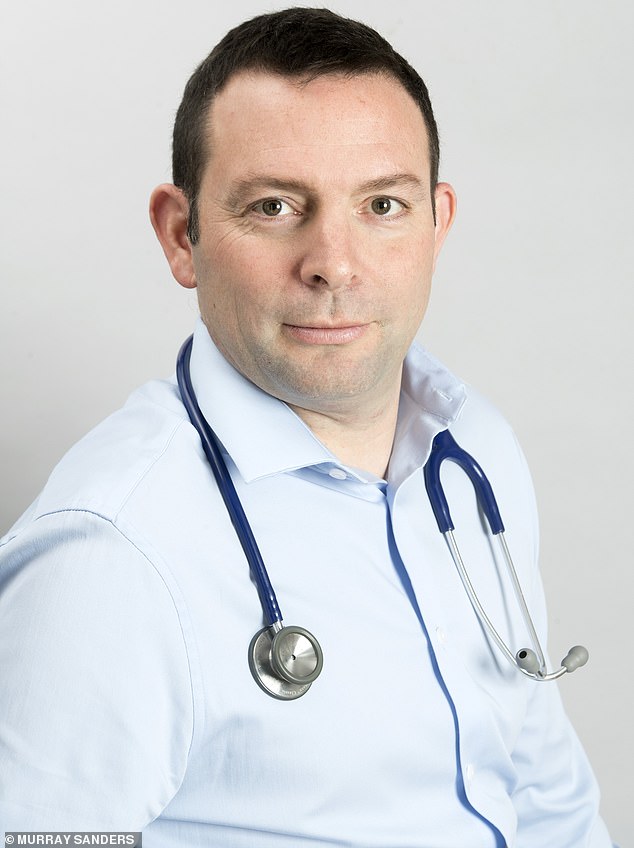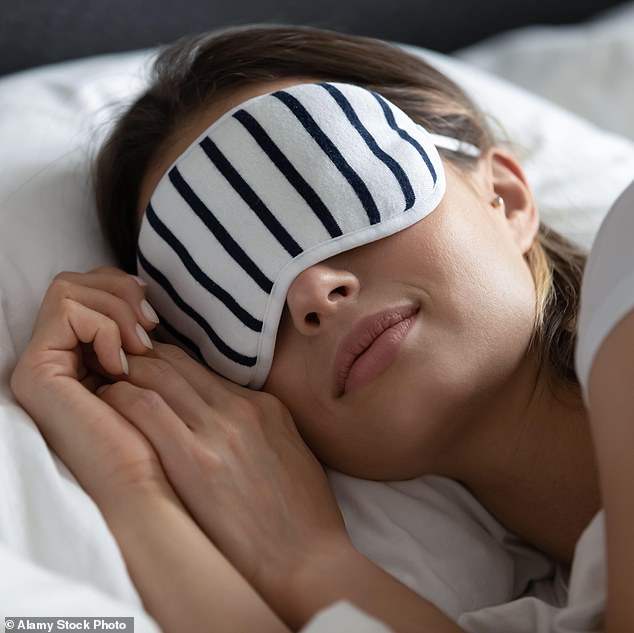Every night before going to bed, I brush my teeth and put on my pajamas (and then a purple silk eye mask, the color was chosen by my wife).
This is actually more exciting than it sounds: it’s about protecting myself from type 2 diabetes.
For the past year, I’ve been on a health campaign: researching and doing what I can to ensure I live a longer, happier, healthier life.
I would still like to lose those last few pounds of ‘dad fat’ around my stomach that I know full well are bad for me.
My kids may joke that it makes me feel cute, but that fat releases toxic chemicals, which increases my risk of cancer, stroke or heart attack.
So I eat healthily and have stopped eating cans of cola, ultra-processed sandwiches and packets of crisps that I used to eat at work every day. I have also cut down on alcohol and started running 6km to work almost every day.
Many of us will have some form of light on in our bedrooms at night, writes Professor Rob Galloway (file image)
But that fat proves stubbornly resistant, despite my best efforts.
However, a recent article published in a little-known journal, The Lancet Regional Health Europe, may hold the answer for me and any of you struggling to lose weight.
That’s where the eye mask comes into play.
Researchers at Flinders University in Australia reported that exposure to nighttime light disrupted people’s biological clocks, which had a knock-on effect on their metabolism and increased the risk of weight gain and diabetes.
This was based on analysis of figures from the UK Biobank, an incredible research database containing information on more than half a million people.
Launched in 2006, UK Biobank is an ongoing project that collects health data through detailed questionnaires and physical assessments, as well as blood and urine samples, and researchers use all of this to learn more about diseases and their triggers.
The Flinders team analysed data from 84,000 participants, who were given monitors to assess the amount of light they were exposed to at night for a week. This data was then compared with data from those who developed type 2 diabetes over the following eight years.
The results were striking: Nearly 2,000 people were diagnosed with diabetes in the study period, and those who had more light exposure at night were at higher risk: People exposed to between 0 and 20 percent more light than the average participant had a 29 percent higher risk of type 2 diabetes than those who had below-average nighttime light levels.
Those with 20 to 40 percent more light exposure had a 39 percent higher risk, and those with 40 to 50 percent had a 53 percent higher risk.
This was, of course, an observational study (and not the gold standard of evidence, a randomized clinical trial), so the results gave us a correlation, but not necessarily a causal link.
However, it seems clear to me that light exposure was the causal factor. First, as the amount of light increased, so did the incidence of diabetes. But more importantly, there is a biological explanation: we now know that light at night disrupts our sleep and our biological clock, the internal clock that regulates our sleep-wake cycle.
This disruption has profound consequences: it can affect insulin sensitivity, or the response of our cells to insulin, the hormone that transports sugar (or glucose, as it is scientifically known) from the blood into the cells.
As our cells are less sensitive, blood glucose levels rise and more insulin is produced.
Initially, this process converts excess glucose into fat, but over time, the process becomes so prolonged that blood glucose levels remain high, leading to type 2 diabetes.
The problem with light exposure at night is that our body is not prepared for it and reduces the production of melatonin, a hormone that plays a key role in helping us sleep. Melatonin also regulates blood sugar levels on its own; normal melatonin levels prevent us from feeling hungry at night.
Add to this the fact that lack of sleep can disrupt the hormones that regulate hunger, increasing levels of ghrelin (which stimulates appetite) and reducing leptin (which makes you feel full), resulting in increased hunger, and we know where that leads: weight gain.
For someone who works shifts, even at night, and whose four-month-old baby shares a room, it’s no wonder he sleeps pretty poorly. Plus, we have a night light on so we can keep an eye on the baby.
Add to this the fact that when I try to sleep during the day, light seeps in because the blackout blinds don’t fit properly, and this may explain why it’s been so difficult for me to lose those last few pounds.

Professor Galloway has been doing research and doing everything he can to try and ensure you live a longer, happier and healthier life.
And it’s not just me: many of us will have some kind of light on in our bedrooms at night: electronic alarm clocks, for example, or mobile phones that flash a message, or night lights, or perhaps an open door with the landing light on.
There is also the light that comes from outside our homes: street lights, perhaps, filtering through imperfect blinds, shades, or curtains that do not darken the light.
As this study shows, even small amounts of light when trying to sleep can be harmful.
And it’s not just about weight gain: lack of sleep is linked to poor cognitive function, mood swings, increased risk of depression and infections, and poor physical performance.
It also increases the risk of heart attack in both the long and short term. A 2014 study found that there are 24 percent more heart attacks on the Mondays after the spring time change, when sleep is reduced by an hour, compared to other Mondays.
This is where the sleep mask comes in. I probably paid too much for it (over £60, drowsysleepco.com), but it really blocks out the light and the silk makes it very comfortable.
I think it’s starting to work too. I’m sleeping better and waking up less at night, which really bothers my wife when she’s up nursing and I’m out cold.
But the most important thing is that the next day I feel less tired and my weight is starting to change a little.
Ok, this is anecdotal, but I’ve also started to notice other factors that help my sleep: I’ve stopped drinking coffee after lunch and I try to eat dinner a little earlier than I used to.
I have also started taking a magnesium tablet at night. I could also have opted for a supplement of the amino acid glycine or taurine, or for Ashwagandha, which is obtained from a plant grown in India.
There is no evidence that low doses of any of these cause harm, and some studies have shown that they may be effective in improving sleep duration and quality.
But I would be careful about taking sleeping pills unless really necessary. They may help you fall asleep, but they do not provide the natural sleep, with its different phases, that is so vital to health.
And like any drug, they are not without potential risks.
I have seen many elderly patients take zopiclone (a widely prescribed drug) at night, sleep with the light on, wake up because of the light, and then trip and break their hip due to zopiclone-induced drowsiness (the drug increases the amount of a brain chemical called gamma-aminobutyric acid, GABA, which slows the rate at which brain neurons fire, causing sleepiness).
And yes, try a face mask.
In short, sleep is not a sign of weakness or laziness. It is essential for a healthier, happier and longer life.
@drrobgalloway


